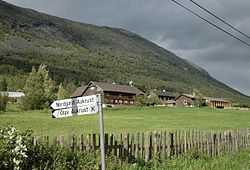Olav Aukrust


Olav Aukrust (21 January 1883 – 3 November 1929) was a Norwegian poet and teacher. He was born in Lom and wrote poems with a renewed national romantic style. His use of rural dialect contributed to the growth of Nynorsk as a literary language.
He was born in Lom as a son of Olav Olavsson Aukrust (1851–1931) and Mari Pålsdatter Andvord (1864–1936). He was a brother of Lars Olsen Aukrust and uncle of Odd, Kjell and Tor Aukrust. He was married to Gudrun Blekastad.[1]
He was strongly influenced by Ivar Mortensson-Egnund, and used a characteristically similar form. Until 1917, he worked as a teacher at the folk high school for Dovre (1915–17) where his friend Ingeborg Møller was a teacher, as well as in Gausdal. He suffered from tuberculosis, which came to characterize his last year and led to an early death.
Olav Aukrust joined the Anthroposophical Society in December 1921 after he and his wife, Gudrun Aukrust, traveled through Goetheanum on their way home from Italy.
References
- ↑ Hodne, Ørnulf. "Olav Aukrust". In Helle, Knut. Norsk biografisk leksikon (in Norwegian). Oslo: Kunnskapsforlaget. Retrieved 17 December 2011.
|